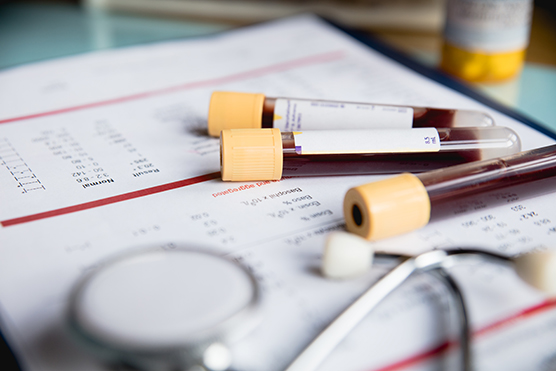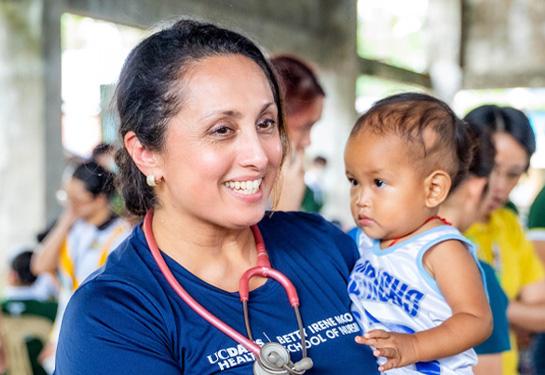Thrombocytopenia
Receive exceptional thrombocytopenia (low platelet count) care from a program with a decades-long history of excellence. Our expertise helps you receive timely treatment that optimizes your quality of life.
Medically reviewed by Brian Jonas, M.D. on Oct. 12, 2023.

What Is Thrombocytopenia?
Thrombocytopenia occurs when you have low platelet levels. These blood cells contain special proteins that clump together, forming a clot that stops bleeding. With low platelets, you have a higher risk of excessive bleeding internally and through cuts in your skin.
At the UC Davis Health Hemostasis and Thrombosis Center, we have been treating and researching bleeding disorders like thrombocytopenia since 1972. Our expertise helps you receive a timely diagnosis and personalized therapies to meet your changing needs.
Symptoms of Low Platelets
Thrombocytopenia symptoms may develop over time or suddenly. Some people have no symptoms.
Common Thrombocytopenia Symptoms
- Bleeding gums
- Blood in your urine or stool
- Frequent nosebleeds
- Heavy menstrual bleeding
- Long-lasting bleeding or frequent bruising from minor injuries
- Petechiae, collections of blood under your skin from leaky blood vessels
- Purpura, similar to petechiae, but with smaller spots that may resemble a rash
Emergency Symptoms of Low Platelets
Seek immediate medical attention for severe thrombocytopenia symptoms.
- Bleeding that won’t stop
- Profuse bleeding that quickly soaks through multiple bandages
What Causes Thrombocytopenia?
Low platelet count occurs when your bone marrow cannot make enough platelets. It may also happen when medical issues destroy or trap platelets, preventing them from doing their job.
Autoimmune Disease
Your body’s immune system mistakes platelets for germs and attacks them. Autoimmune disease may also cause your body to make fewer platelets.
Infections
Infections that can cause thrombocytopenia include HIV, hepatitis C, sepsis (blood infection) and malaria. Germs from tick bites can also cause vector-borne diseases, like brucellosis, that affect platelet counts.
Medications
Certain drugs, like ibuprofen and sulfonamides (an antibiotic), can suppress your body’s ability to produce platelets.
Thrombocytopenia Risk Factors
Certain factors can increase your risk for low platelet count, including:
Genetics
You can inherit gene mutations that increase the likelihood of thrombocytopenia.
Existing Medical Issues
Pregnancy, alcohol use disorder, nutrient deficiencies, blood cancers and an overactive spleen are some conditions that can affect platelet count.
Toxic Chemicals
Ongoing exposure to substances such as pesticides and arsenic can lower platelet counts.
Diagnosis and Testing of Thrombocytopenia
UC Davis Health is home to a sophisticated hemostasis laboratory where we conduct special blood tests not widely available. Evaluations for thrombocytopenia may involve analyzing platelet volume, size and shape. We also check for signs of other medical conditions that cause low platelets.
Thrombocytopenia Treatments
Our Division of Hematology and Oncology successfully treats common and complex cases from across inland Northern California. Depending on the cause and symptoms, you receive services from experts in hematology, gastroenterology and hepatology, infectious disease and emergency medicine.
Immunoglobulins
These medications stop immune system attacks on your platelets. Immunoglobulins are for severe cases of low platelets due to autoimmune disease.
Medications
Steroids can temporarily boost platelet levels. You may also need drugs like romiplostim that support platelet development.
Splenectomy
If your spleen is trapping platelets, we perform surgery to remove it. You can live a healthy life without a spleen, but precautions are necessary to avoid illnesses and infections.
Transfusion
This procedure delivers a fresh supply of platelets or blood through a blood vessel. Transfusion is often a treatment for emergency symptoms of low platelets.
Preventing Thrombocytopenia
It’s not possible to prevent all thrombocytopenia causes. But some are within your control.
Avoid Infections
Take extra precautions to avoid infections, like washing your hands and disinfecting high-touch surfaces.
Optimize Nutrition
Vitamin B12 and folate help your bone marrow produce platelets. You can find these nutrients in leafy greens, beans and lean proteins like fish.
Take Medication Alternatives
If you need medications, talk to your provider about the safest options. Certain antibiotics, blood thinners and anti-inflammatories can affect platelet count.
What is a healthy platelet count?
150K-400KPer microliter of blood
Platelet count in people with thrombocytopenia
<150,000Per microliter of blood
Source: National Heart, Lung, and Blood Institute: Thrombocytopenia
Request an Appointment
As Sacramento's No. 1 hospital, you'll benefit from unique advantages in primary care and specialty care. This includes prevention, diagnosis and treatment options from experts in 150 specialties.
Referring Physicians
To refer a patient, submit an electronic referral form or call.
800-4-UCDAVIS
Patients
Call to make an appointment.
Consumer Resource Center
800-2-UCDAVIS

Ranked among the nation’s best hospitals
A U.S. News & World Report best hospital in cardiology, heart & vascular surgery, diabetes & endocrinology, ENT, geriatrics, neurology & neurosurgery, and pulmonology & lung surgery.

Ranked among the nation’s best children’s hospitals
U.S. News & World Report ranked UC Davis Children’s Hospital among the best in pediatric nephrology, orthopedics*, and pulmonology & lung surgery. (*Together with Shriners Children’s Northern California)

Ranked Sacramento’s #1 hospital
Ranked Sacramento’s #1 hospital by U.S. News, and high-performing in aortic valve surgery, back surgery (spinal fusion), COPD, colon cancer surgery, diabetes, gynecological cancer surgery, heart arrhythmia, heart failure, kidney failure, leukemia, lymphoma & myeloma, lung cancer surgery, pacemaker implantation, pneumonia, prostate cancer surgery, stroke, TAVR, cancer, orthopedics, gastroenterology & GI surgery, and urology.

The nation’s highest nursing honor
UC Davis Medical Center has received Magnet® recognition, the nation’s highest honor for nursing excellence.

World-class cancer care
One of ~59 U.S. cancer centers designated “comprehensive” by the National Cancer Institute.

A leader in health care equality
For the 13th consecutive year, UC Davis Medical Center has been recognized as an LGBTQ+ Healthcare Equality Leader by the educational arm of America’s largest civil rights organization.

